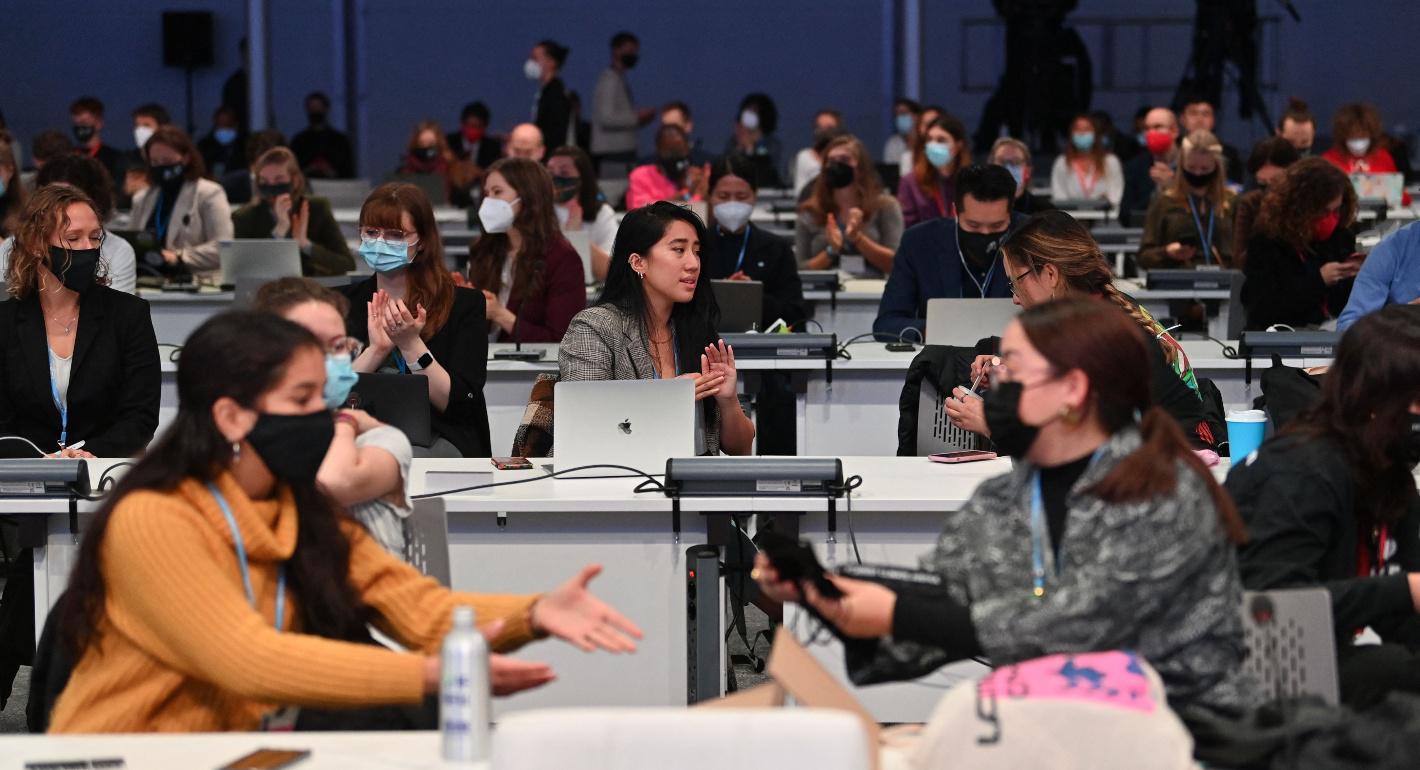The climate transition will entail political change as much as technological innovation. This is an undervalued but important lesson from both the Glasgow Climate Change Conference (COP26) and the current crisis unleashed by rising energy prices across Europe. Democratic governments will inevitably face increasing stresses, with far-reaching social and political effects. Yet they appear ill-prepared to manage them.
The climate agenda is still being defined in ways that underplay the political challenges—even as European democratic systems are now moving into the thorniest political thickets of the ecological transition. Governments need to widen democratic buy-in for the difficult decisions that lie ahead: national conferences on the political and social elements of the transition could help them do so.
Turbulence Ahead
It is often said that democracies have a better record than autocracies on climate policy, that democracies have made more ambitious climate change commitments, and that the energy transition requires more not less democracy. This may be true, but the focus on democracy’s advantages over other systems diverts attention from the impending turbulence almost certain to hit Europe’s democratic systems.
To date, the climate debate has been couched in a binary for-or-against way: whether one supports ambitious climate action or not. The ecologically committed present themselves as championing the right side of the argument against so-called deniers. In Europe, a broad consensus has emerged that serious climate action is necessary. Many European leaders have succeeded in generating public support for climate action, with polls showing that most voters now want firm action against climate disruption.
But while this general battle has been at least partially won in most European countries, difficult debates and divergences lie ahead. Relevant issues include the desired political steps to advance the transition, the types of necessary climate actions, and particularly their likely social and political effects. COP26 showed once again how the political debate tends to be framed by a general imperative for the energy transition and macro-level emissions targets. Yet more micro-level issues will soon shift the focus to the transition’s relative costs and benefits—especially who pays for what and how these decisions are to be made within democratic political systems.
The deep problem here is that politics is still functioning on the assumption that core political and economic models will stay the same and that low-carbon energy sources will simply replace high-carbon ones. Historically, however, no move from one production mode to another has happened without profound, even systemic, political and social transformations. This political framing leans heavily on the power attributed to green growth and presents a highly sanitized vision of an ecological transition while underplaying the costly social and political disruptions likely to hit many parts of society. The gap between energy demand and supply will almost certainly widen, as the generation of renewable energy is unlikely to keep up with increasing demand—and this growing gap will have significant social and political consequences
Governments and EU leaders routinely promise a “just transition,” but so far they have done little to conceptualize this as a systemic change. Far more attention has been paid to strengthening climate justice between states rather than within individual national political systems. Crucially, piloting a fair transition will not just be about allocating funds to help poorer residents pay for insulation, hydrogen boilers, and the like. At its height, the transition will shake the social contracts that have undergirded democratic systems and will have profoundly political effects. The whole political economy of European democracy will undergo fundamental reform. With governments no longer able to promise or pursue economic growth as their main deliverable to voters in the same way as before, there will be implications for the sustainability of welfare states and hence for the social legitimacy of democratic institutions.
In this context, the middle ground of consensual catch-all politics across Europe may collapse. Layers of political restructuring could ensue. Power will shift in fundamental ways as and when vested interests are tackled to unblock the road toward a green transition. Members of social and class alliances will be pulled in different directions. Existing social divides are likely to be replaced or at least complemented by new ones. The foundations of current divides between political parties will begin to make less sense: in countries like Germany and the UK, differences over the costs of the energy transition are already cutting across traditional left-right divides.
Since the summer of 2021, the energy crisis across Europe has shone an additional, unforgiving spotlight on governments’ failure to pay attention to these political dimensions of the climate transition. The Economist suggests that the surge in electricity prices may be the “first crisis of the energy transition.” The unrest triggered in recent months—including protests against rising energy prices, as well as fractious parliamentary debates—has raised more searching questions about how the costs of the transition will be managed.
While such transition pains have long been foretold, governments have done little to preempt them. Instead, they have scrambled to put together ad hoc subsidy packages to offset price rises and have moved to classify gas as a green energy source in the EU’s so-called taxonomy rules. Pushed through in haste to placate voters, these measures incentivize more carbon consumption. The juxtaposition has been striking: during the COP26 summit, the EU pressed other powers to move away from carbon consumption, while it offered subsidies to its own citizens to maintain such consumption.
Democratic Buy-In
So what kinds of democratic realignments and strategies are needed to correct Europe’s overly narrow political approach to the climate transition? A shift in the debate is certainly overdue—particularly regarding how democratic processes should deal with new social and economic arrangements. A common refrain is that leaders need to rise above politics to steer the climate transition. But this is exactly the wrong way of thinking about the challenge: instead, the political sphere must take center stage because this is where changes need to be hashed out and legitimized.
The already apparent risk is that governments will seek to push through climate policies in a top-down fashion to circumvent increasingly acute political difficulties. In their haste to implement renewable energy projects, governments are now often bypassing channels of democratic accountability. This is happening, for example, under the European Green Deal. The EU’s Rapid Recovery Fund will have billions of euros to spend on green projects, but no inclusive political process has been set up to decide who gets the funds.
While the desire to get climate action moving is understandable, this technocratic approach to the ecological transition could simply generate more popular frustration and provoke deeper political crises in Europe. The new funds could easily become a source of even more severe polarization and political discontent if they are not managed transparently and with meaningful citizen participation.
To give people a say over the transition to net-zero carbon emissions, many European governments and local authorities have begun running climate assemblies. These assemblies offer randomly selected groups of 100 to 150 citizens the chance to suggest ways for making progress toward the net-zero target. But, while enormously valuable, they cannot deal with all the major political disputes, tensions, and cleavages that will complicate the energy transition. These forums do not engage enough people or address the power relations between different collective groups in society and the economy.
Reports from these assemblies commonly read like a shopping list of all the ideal and general features of a green transition. They typically say little about the tensions between policy goals—for example, the juxtaposition between speeding up the green transition and redressing existing (fossil) fuel poverty. For their part, governments tend to respond that they are supportive and have already committed to many of the proposed steps—leaving one wondering why so many problems and political tensions have grown if it were really so easy for all actors to agree on all measures. Climate assemblies are certainly a necessary and exciting innovation, but other reforms to democratic practices are also needed to broach the macro-level politics of who pays for the transition and how societies can push beyond the superficial focus on technological fixes toward full-scale adjustments to economic and political models.
The vital political metric will be democratic buy-in, especially from those set to lose their jobs or pay disproportionately for measures related to the transition. Democracy in this context must mean more than loose assertions about giving citizens a say. A deeper and broader framework of inclusion is required concerning the sharing of costs and the containment of vested interests. A crucial step will be for governments and EU institutions to move away from tempting technocratic approaches. As state capacities increase massively to inject the necessary funding for the transition, new and strengthened means of democratic control will be needed. Democratic systems must achieve buy-in that is much more all-embracing and that matches the scale of transformations ahead.
One option may be to establish national conferences that involve all stakeholders and incorporate multiple perspectives on the energy transition. Inclusive national conferences have been used effectively before, such as during democratic transitions across Africa. Such national conferences can convene many actors, including political parties, state bodies, organized civil society, select individuals, local administrations, and climate activists—with the express purpose of gaining broader buy-in.
Green national conferences would need to focus specifically on the likely social and political ramifications of the energy transition—and the resulting new arrangements—rather than simply reiterate the general case for climate action. The conferences could feed into the work of climate assemblies but should go well beyond the latter in breadth and politicization. Climate activists could play a vital role but would need to find common ground with those set to pay the heaviest price of social change associated with the climate transition. Activist groups with contrasting approaches, including, say, the international Fridays for Future movement and France’s more confrontational Yellow Vests movement, each have a legitimate standpoint but so far have been at odds with each other on issues such as energy taxes: national conferences could help bring them together to discuss such divergences. Meanwhile, political parties, expert bodies, and local authorities involved in environmental and social issues would need to help to bridge the political and technocratic aspects of challenges related to the ecological transition.
Such national conferences could help promote active and inclusive dialogue while simultaneously legitimizing governments’ difficult decisions on the political and social effects of the green transition. As democratic mechanisms in and of themselves, the conferences could preemptively protect democracy by mitigating future backlash against technocratic and top-down solutions as well as help prepare governments for necessary changes to existing democratic systems.
In sum, governments, political parties, and activists need to begin considering and preparing for the scale of change needed to navigate the climate transition, and they must offer a more detailed sociopolitical mapping of this challenge and its aftermath. They need to pay equal attention to both the hardware of the transition (such as new types of renewable energy sources) and the software (like the kinds of political processes capable of generating the broader legitimacy and inclusiveness required to sustain the energy transition over the long term). A series of national conferences across European countries could be one way to move the politics of the climate transition in this direction.
Carnegie Europe is grateful to the Open Society Foundations for their support of this work.









